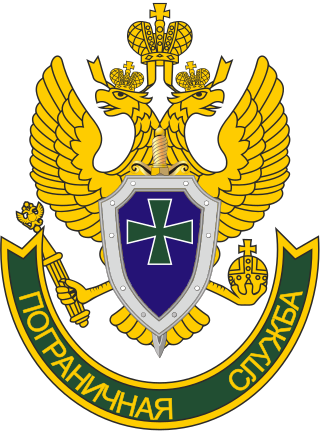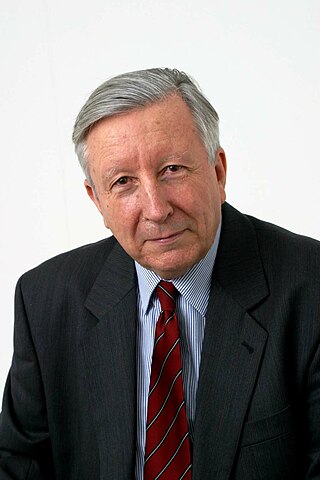In materials science, superplasticity is a state in which solid crystalline material is deformed well beyond its usual breaking point, usually over about 400% during tensile deformation. Such a state is usually achieved at high homologous temperature. Examples of superplastic materials are some fine-grained metals and ceramics. Other non-crystalline materials (amorphous) such as silica glass and polymers also deform similarly, but are not called superplastic, because they are not crystalline; rather, their deformation is often described as Newtonian fluid. Superplastically deformed material gets thinner in a very uniform manner, rather than forming a "neck" that leads to fracture. Also, the formation of microvoids, which is another cause of early fracture, is inhibited. Superplasticity must not be confused with superelasticity.

The Federal Security Service of the Russian Federation (FSB) is the principal security agency of Russia and the main successor agency to the Soviet Union's KGB; its immediate predecessor was the Federal Counterintelligence Service (FSK) which was reorganized into the FSB in 1995. The three major structural successor components of the former KGB that remain administratively independent of the FSB are the Foreign Intelligence Service (SVR), the Federal Protective Service (FSO), and the Main Directorate of Special Programs of the President of the Russian Federation (GUSP).

The Border Service of the Federal Security Service of the Russian Federation is a branch of the Federal Security Service of Russia tasked with patrol of the Russian border.

Yevgenia Markovna Albats is a Russian investigative journalist, political scientist, writer and radio host.
Yuri Andreyevich Osipyan was a Soviet, Russian-Armenian physicist who worked in the field of solid-state physics.

A counterintelligence state is a state where the state security service penetrates and permeates all societal institutions, including the military. The term has been applied by historians and political commentators to the former Soviet Union, the former German Democratic Republic, Cuba after the 1959 revolution, Iraq under Saddam Hussein, China under the Chinese Communist Party (CCP), and post-Soviet Russia under Vladimir Putin, especially since 2012.

Mikhail Ivanovich Barsukov is a former Russian intelligence and government official. His most notable post was as the short-lived head of the Federal Security Service of the Russian Federation (FSB) in mid-1990s.
The Institute of Cryptography, Telecommunications and Computer Science or IKSI (ИКСИ) is a research institute within the Academy of the Federal Security Service of Russia, which trains specialists in areas such as the transfer, protection and processing of information. The key specialist training areas are cryptography, applied mathematics, information technology and digital technology, electrical engineering, radio technology and communications.

The FSB Academy, in full the Academy of the Federal Security Service of the Russian Federation, is an education and research institution federally chartered to prepare Russian intelligence personnel for the Federal Security Service in particular and for the Russian Intelligence Community in general.
Kadir Rakhimovich Timergazin was a Soviet petroleum geologist and a professor of geological-mineralogical science.

Murat Abdulkhakovich Kamaletdinov was a Bashkir petroleum geologist.

Georgy Vyacheslavovich Kurdyumov was a Soviet metallurgist and physicist. He went on to become one of the most famous metallurgist of his time in the Soviet Union. When the Institute of Solid State Physics was established on February 15, 1963, he was one of the main organizers of the institute.
Kuppuswamy Anantha Padmanabhan is an Indian academician well known for his contributions in the field of materials & metallurgical science and engineering. In particular, he is well renowned for his contributions to superplasticity. He is currently professor of eminence (honorary), Anna University, Chennai; member, Research and Innovation Advisory Board, TCS and a research advisor to TCS and Aditya Birla S&T Company. He is a former director of Indian Institute of Technology Kanpur and a former dean, academic research, IIT Madras, India. In 1994, he became the first Indian to receive the "Forschungspreis" of the Alexander von Humboldt Foundation, Germany. For his research contributions, the University of Cambridge, UK, conferred on him the highest academic degree ‘Sc.D’ in 1998, and he is the first Indian engineer/ materials specialist to be conferred this honour. He also served as the Mercator Professor of DFG at the Institute of Materials Physics, University of Münster, Germany.
Atul Harish Chokshi is an Indian materials scientist, metallurgical engineer and a professor at the Department of Materials Engineering of the Indian Institute of Science. He is known for his studies on high temperature deformation and failure of ceramic materials and is an elected fellow of all the three major Indian science academies viz. the National Academy of Sciences, India, Indian Academy of Sciences, and Indian National Science Academy as well as the Indian National Academy of Engineering. The Council of Scientific and Industrial Research, the apex agency of the Government of India for scientific research, awarded him the Shanti Swarup Bhatnagar Prize for Science and Technology, one of the highest Indian science awards for his contributions to Engineering Sciences in 2003.

The Academy of Foreign Intelligence is one of the primary espionage academies of Russia, and previously the Soviet Union, serving the KGB and its successor organization, the Foreign Intelligence Service. It was attended by future President Vladimir Putin during the 1980s.
Song Yuquan was a Chinese materials scientist with a specialization in superplasticity of metals. He was a professor at Jilin University of Technology, and an academician of the Chinese Academy of Sciences.

Ernst Rifgatovich Muldashev is a Russian surgeon ophthalmologist, general director of the All-Russian Center for Ophthalmic and Plastic Surgery in the city of Ufa and author of esoteric books.
The FSB Criminalistics Institute, also the Institute of Criminalistics of the Centre for Special Technology of the Federal Security Service of the Russian Federation, is a division of the Federal Security Service (FSB) of the Russian Federation. The institute provides a variety of services, including polygraph testing, recognition of people or their individual characteristics using biometric data, linguistic expertise, analysis of chemicals, and robotic mine clearance, among others.

Vadim Petrovich Zakharov is a Russian scientist-chemist, high school teacher, Doctor of Chemical Sciences (2004), professor (2009) and acting rector at Bashkir State University. Professor of the Academy of Sciences of the Republic of Bashkortostan (2016). Interim Chairman (2020—2021) and then Chairman of the Ufa Federal Research Center of the Russian Academy of Sciences. Vice-Rector for Research of Bashkir State University (2012—2020).

Terence G. Langdon is a scientist and an academic. He is a Professor of Materials Science at the University of Southampton, and a Professor of Engineering Emeritus at the University of Southern California.












